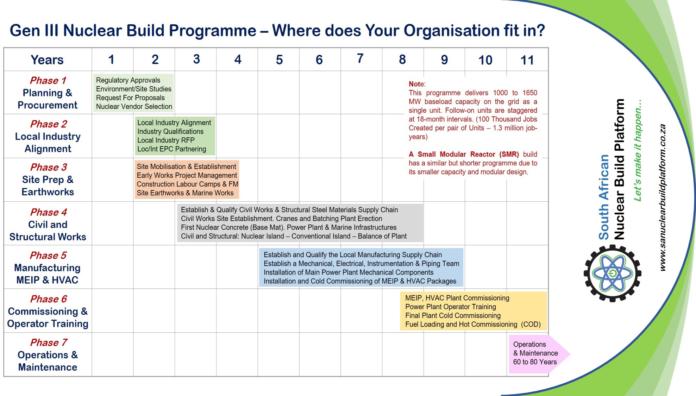“The anti-nuclear lobby group, over the last two decades, has only successfully kept the share of fossil fuels in our global energy mix above 80%”. Unintended consequences?
OVER the last decade, South Africa’s “just transition” toward clean energy has put the Country’s economy at considerable risk by depriving it of energy security, industrial growth, and an effective transition from fossil fuels. South Africa has not met its Paris Agreement goals on decarbonisation and, for consecutive years, has been recording an increase in carbon intensity. To meet these goals, South Africa needs to cut its CO₂ emissions by 60% to 70% by 2050, which could deindustrialise our economy, if we continue getting it wrong. If Africa contributes less than 3% of global CO₂ emissions, then how did we get so distracted, at the expense of our economy, when more viable and proven solutions are at hand?
Our Energy Security:
Due to South Africa’s aging generation assets, we should anyway, see a rapid decline in coal-fired power generation in our energy mix over the next decade, with probably only 10 gigawatts running by 2050. “Clean Coal” could extend its participation but, like most technologies working outside their comfort zones, coal could eventually price itself out of the market.
Similarly, the high volumes of toxic waste being generated by renewable energies globally is putting pressure on the industry to recycle its waste, instead of transferring it to landfill sites. Should these decommissioning and waste management costs be added into its energy production costs, as nuclear energy does, we could also see the cost of renewables escalating exponentially.
South Africa’s coal power decommissioning programme would reduce our generating capacity by over 1 000 MW of baseload capacity per year over the next two decades. Eskom’s declining Energy Availability Factor (EAF) has already started that trend.
The DMRE’s Integrated Resource Plan (IRP 2019) does not adequately address the replacement of this base-load coal power, at a pace and scale we should be implementing. Therefore, beyond 2030, South Africa should be in chronic load-shedding, unless an effective energy transition is implemented soon.
A transition to a more decarbonised energy future is possible through a balanced portfolio of energy solutions which deliver energy security, access to affordable baseload energy, environmental sustainability, and economic development (jobs), as its key criteria. All the generation technologies we have at South Africa’s disposal can achieve this together.
As demonstrated in France, nuclear energy can deliver all these criteria on its own and should therefore be prominent in South Africa’s sustainable energy transition. All technologies can be made cleaner and more reliable with add-on technologies, but these additional costs tend to raise their cost per kWh or their overall CO₂ emissions. Eskom should no longer subsidise these “enforced technologies” when more effective solutions are at hand.
Had we followed through with the 2007 9.6GW nuclear procurement programme, we would have had an additional 5 000 MW of clean baseload energy on the grid, producing 40TWh of electricity per year, which would have doubled again over the next five years. This would have avoided the devastating load-shedding and brought us a lot closer to our decarbonisation goals.
The only way to sustainably replace our retired coal fleet is with clean baseload power like large-scale hydro or nuclear energy. As we have seen since 2007, once you have broken your baseload foundation, it is near impossible to fix, unless one reduces demand through economic slowdown, which load-shedding ultimately does.
Nuclear energy is easily funded through innovative and competitive financing structures. Small Modular Reactors (SMRs) are receiving significant global attention and investment, making nuclear energy a great catalyst to kick-start our post-Covid economy. South Africa is well positioned to implement large and small-scale reactors to achieve the best economies of scale.
Our retired coal power plant sites would be ideal locations for SMRs. Their valuable infrastructures, including the local skilled resources that can be upskilled and re-employed, will reduce costs, and revitalise a local community. By-products like process heat and green hydrogen can also add value to those economies.
South Africa’s Renewable Energy, Gas to Power and Embedded Generation programmes, can also play a vital role in balancing our energy portfolio through distributed power systems at our load centres and beyond the grid. Environmental purists are also finding gas generation at CO₂ 490 g/kWh as unacceptable, leaving renewables (without batteries), hydro and nuclear energy as the leading low-carbon technologies.
The Risk Mitigation Independent Power Producer Programme (RMIPPP) could have also considered upgrading our expensive, high-emissions Diesel Peakers to Combined Cycle Gas Turbines (CCGT), fuelled with cheaper and cleaner Liquefied Natural Gas (LNG). This would have been an investment in our existing Eskom and IPP assets by effectively raising their capacity from 10%+ to 50%+ and providing an abundance of dispatch able power on demand. LNG could also become a domestic fuel source soon through Total’s explorations.
Only a robust and workable energy expansion plan would get South Africa on a transition path toward energy security, environmental sustainability, and economic prosperity. It is concerning that this robust plan still eludes us after two decades, even with the valuable lessons we have from the global energy sector.















